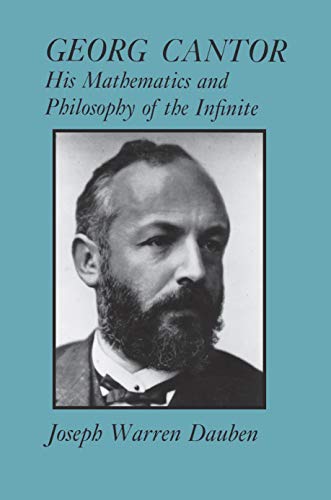Customer Services
Copyright © 2025 Desertcart Holdings Limited
Desert Online General Trading LLC
Dubai, United Arab Emirates


Georg Cantor: His Mathematics and Philosophy of the Infinite
G**R
Cantor, A Top Mathematician Who Unifies God and Sciene
This is a great book on the work of Georg Cantor.The new millennium brought forth a new human hope -- to unify `that which is physical' with `that which is spiritual.' This hope would unify the fields of science and theology. Currently, these fields are separated by their different beliefs and methods of truth seeking. On beliefs, many scientists do not believe in God whereas all theologians believe in God. On truths, scientists use the scientific method to express true scientific statements whereas theologians use feelings, phenomena, and scriptures to express true theological statements.I believe that all `big discoveries' unify 'that which is physical' with 'that which is spiritual.' For instance, the big discovery of Nicholas of Cusa unifies an infinite God and our finite universe. And, the big discovery of Leibniz unifies spiritual atoms with all physical things in the universe. Further, the big 1920 discovery of symbolic languages allows us to speak about God and the universe using the same symbolic language. In this book on Cantor, one earns that the mathematics and infinities of Georg Cantor is another `big discovery' that unifies God and the universe.Cantor's theory of the infinity reveals two infinities. One is the `non-genuine' infinite. This infinity is incomplete. It applies to variable magnitudes in the universe, as they either grow beyond all limits or diminishes to an arbitrary smallness. This infinity always remains finite. Cantor's transfinite numbers orders and counts all non-genuine infinities. On the other hand, the `genuine' infinity is determinate, unchanging, and complete. It is found in the complex variables used by scientists. There, the determinate infinity is the single point at infinity. Complex variables in the neighborhood of this single point are thus analytical. The genuine infinity is also used by theologians to represent God.It is obvious that organized research on these big discoveries must be increased considerably by all nations. To start organizing this research effort, I am writing a book on symbolic languages and the big discoveries of Cusa, Leibniz, and Cantor.
K**Y
Five Stars
Interesting read.
C**Y
Great ... and a few warnings
This is the definitive book about George Cantor, the brilliant mathematician whose work includes the groundbreaking development of both set theory and transfinite numbers.Interestingly, the author's preface says this is not a biography of Cantor, though it does include personal information, especially as it relates to Cantor's intellectual development and emotional issues. Rather, it's a thorough and rigorous exposition of his mathematical and philosopical ideas. Dauben says, "... this book represents a study of the pulse, metabolism, even in part the psychodynamics of an intellectual process: the emergence of a new mathematical theory".But, a few warnings. While both the Amazon and jacket blurb claims this is for the "general reader", it is not. It is most definitely NOT a popularization, and I don't think the publisher tries to make that clear. It is a scholarly tract, an extension of Dauben's Harvard doctoral dissertation, and it seems he has not watered it down much. It is highly technical, with many equations, and is primarily written for academicians who are fluent in higher mathematics (clearly, not a large potential audience for the book!). Consistent with such a scholarly publication, it includes excellent index, bibliography, and notes sections, with many entries being technical, from obscure journals, and/or in foreign languages.I found that my three semesters of college calculus (though no set theory) were inadequate preparation to follow many of the mathematical arguments. If you have an undergraduate or higher degree in pure mathematics, you should have no trouble.Dauben also uses a fair amount of German, and a little French and Latin, all without translation -- you're expected to know these things.It's possible to get a sense of Cantor's accomplishments by simply skipping over the math and foreign languages that are beyond you, although the more prepared you are in these areas, the more you'll get out of the book.However, if you're interested in the history of math but want to avoid the naked technicalities, I instead recommend William Dunham's "Journey Through Genius", which uses nothing beyond high-school mathematics. Dunham's book has twelve readable chapters on significant mathematical discoveries, and as a measure of Cantor's importance, he, like Euclid and Euler, gets two chapters while Archimedes, Newton, and the rest get just one.
Trustpilot
1 month ago
3 weeks ago